- Home
- Neil Gaiman
Angels and Visitations Page 3
Angels and Visitations Read online
Page 3
Mrs Whitaker was very tender-hearted when it came to slugs. She would take them down to the back of her garden, which bordered on the railway line, and throw them over the fence.
She cut some parsley for the salad. There was a cough behind her. Galaad stood there, tall and beautiful, his armour glinting in the morning sun. In his arms he held a long package, wrapped in oiled leather.
“I’m back,” he said.
“Hello,” said Mrs Whitaker. She stood up, rather slowly, and took off her gardening gloves. “Well,” she said, “now you’re here, you might as well make yourself useful.”
She gave him the plastic bag full of slugs, and told him to tip the slugs out over the back of the fence.
He did.
Then they went into the kitchen.
“Tea? Or lemonade?” she asked.
“Whatever you’re having,” Galaad said.
Mrs Whitaker took a jug of her homemade lemonade from the fridge and sent Galaad outside to pick a sprig of mint. She selected two tall glasses. She washed the mint carefully and put a few leaves in each glass, then poured the lemonade.
“Is your horse outside?” she asked.
“Oh yes. His name is Grizzel.”
“And you’ve come a long way, I suppose.”
“A very long way.”
“I see,” said Mrs Whitaker. She took a blue plastic basin from under the sink and half-filled it with water. Galaad took it out to Grizzel. He waited while the horse drank, and brought the empty basin back to Mrs Whitaker.
“Now,” she said. “I suppose you’re still after the Grail.”
“Aye, still do I seek the Sangrail,” he said. He picked up the leather package from the floor, put it down on her tablecloth and unwrapped it. “For it, I offer you this.”
It was a sword, its blade almost four feet long. There were words and symbols traced elegantly along the length of the blade. The hilt was worked in silver and gold, and a large jewel was set in the pommel.
“It’s very nice,” said Mrs Whitaker, doubtfully.
“This,” said Galaad, “is the sword Balmung, forged by Wayland Smith in the dawn times. Its twin is Flamberge. Who wears it is unconquerable in war, and invincible in battle. Who wears it is incapable of a cowardly act or an ignoble one. Set in its pommel is the sardonynx Bircone, which protects its possessor from poison slipped into wine or ale, and from the treachery of friends.”
Mrs Whitaker peered at the sword. “It must be very sharp,” she said, after a while.
“It can slice a falling hair in twain. Nay, it could slice a sunbeam,” said Galaad, proudly.
“Well, then, maybe you ought to put it away,” said Mrs Whitaker.
“Don’t you want it?” Galaad seemed disappointed.
“No, thank you,” said Mrs Whitaker. It occurred to her that her late husband, Henry, would have quite liked it. He would have hung it on the wall in his study next to the stuffed carp he had caught in Scotland, and pointed it out to visitors.
Galaad re-wrapped the oiled leather around the sword Balmung, and tied it up with white cord.
He sat there, disconsolate.
Mrs Whitaker made him some cream cheese and cucumber sandwiches, for the journey back, and wrapped them in greaseproof paper. She gave him an apple for Grizzel. He seemed very pleased with both gifts.
She waved them both good-bye.
That afternoon she took the bus down to the hospital to see Mrs Perkins, who was still in with her hip, poor love. Mrs Whitaker took her some homemade fruit cake, although she had left out the walnuts from the recipe, because Mrs Perkins’s teeth weren’t what they used to be.
She watched a little television that evening, and had an early night.
On Tuesday, the postman called. Mrs Whitaker was up in the box-room at the top of the house, doing a spot of tidying, and, taking each step slowly and carefully, she didn’t make it downstairs in time. The postman had left her a message which said that he’d tried to deliver a packet, but no-one was home.
Mrs Whitaker sighed.
She put the message into her handbag, and went down to the post office.
The package was from her niece Shirelle in Sydney, Australia. It contained photographs of her husband, Wallace, and her two daughters, Dixie and Violet; and a conch shell packed in cotton wool.
Mrs Whitaker had a number of ornamental shells in her bedroom. Her favourite had a view of the Bahamas done on it in enamel. It had been a gift from her sister, Ethel, who had died in 1983.
She put the shell and the photographs in her shopping bag. Then, seeing that she was in the area, she stopped in at the Oxfam shop on her way home.
“Hullo Mrs W.,” said Marie.
Mrs Whitaker stared at her. Marie was wearing lipstick (possibly not the best shade for her, nor particularly expertly applied; but, thought Mrs Whitaker, that would come with time), and a rather smart skirt. It was a great improvement.
“Oh. Hello, dear,” said Mrs Whitaker.
“There was man in here last week, asking about that thing you bought. The little metal cup thing. I told him where to find you. You don’t mind, do you?”
“No, dear,” said Mrs Whitaker. “He found me.”
“He was really dreamy. Really, really dreamy,” sighed Marie, wistfully. “I could of gone for him.
“And he had a big white horse and all,” Marie concluded. She was standing up straighter as well, Mrs Whitaker noted approvingly.
On the bookshelf Mrs Whitaker found a new Mills & Boon novel—Her Majestic Passion—although she hadn’t yet finished the two she had bought on her last visit.
She picked up the copy of Romance and Legend of Chivalry, and opened it. It smelled musty. Ex Libris Fisher was neatly handwritten at the top of the first page, in red ink.
She put it down where she had found it.
When she got home, Galaad was waiting for her. He was giving the neighbourhood children rides on Grizzel’s back, up and down the street.
“I’m glad you’re here,” she said. “I’ve got some cases that need moving.”
She showed him up to the box-room in the top of the house. He moved all the old suitcases for her, so she could get to the cupboard at the back.
It was very dusty up there.
She kept him up there most of the afternoon, moving things around while she dusted.
Galaad had a cut on his cheek, and he held one arm a little stiffly.
They talked a little, while she dusted and tidied. Mrs Whitaker told him about her late husband, Henry; and how the life insurance had paid the house off; and how she had all these things but no-one really to leave them to, no-one but Ronald really and his wife only liked modern things. She told him how she had met Henry, during the war, when he was in the A.R.P. and she hadn’t closed the kitchen blackout curtains all the way; and about the sixpenny dances they went to in the town; and how they’d gone to London when the war had ended, and she’d had her first drink of wine.
Galaad told Mrs Whitaker about his mother Elaine, who was flighty and no better than she should have been and something of a witch to boot; and his grandfather, King Pelles, who was well-meaning although at best a little vague; and of his youth in the Castle of Bliant on the Joyous Isle; and his father, whom he knew as ‘Le Chevalier Mal Fet’, who was more or less completely mad, and was in reality Lancelot du Lac, greatest of knights, in disguise and bereft of his wits; and of Galaad’s days as a young squire in Camelot.
At five o’clock Mrs Whitaker surveyed the box-room and decided that it met with her approval; then she opened the window so the room could air, and they went downstairs to the kitchen, where she put on the kettle.
Galaad sat down at the kitchen table.
He opened the leather purse at his waist and took out a round white stone. It was about the size of a cricket ball.
“My lady,” he said, “This is for you, an you give me the Sangrail.”
Mrs Whitaker picked up the stone, which was heavier than it looked, and held it up to the light.
It was milkily translucent, and deep inside it flecks of silver glittered and glinted in the late afternoon sunlight. It was warm to the touch.
Then, as she held it, a strange feeling crept over her: deep inside she felt stillness and a sort of peace. Serenity: that was the word for it; she felt serene.
Reluctantly she put the stone back in the table.
“It’s very nice,” she said.
“That is the Philosopher’s Stone, which our forefather Noah hung in the Ark to give light when there was no light; it can transform base metals into gold; and it has certain other properties,” Galaad told her, proudly. “And that isn’t all. There’s more. Here.” From the leather bag he took an egg, and handed it to her.
It was the size of a goose egg, and was a shiny black colour, mottled with scarlet and white. When Mrs Whitaker touched it the hairs on the back of her neck prickled. Her immediate impression was one of incredible heat and freedom. She heard the crackling of distant fires, and for a fraction of a second she seemed to feel herself far above the world, swooping and diving on wings of flame.
She put the egg down on the table, next to the Philosopher’s Stone.
“That is the Egg of the Phoenix,” said Galaad. “From far Araby it comes. One day it will hatch out into the Phoenix Bird itself; and when its time comes, the bird will build a nest of flame, lay its egg, and die, to be reborn in flame in a later age of the world.”
“I thought that was what it was,” said Mrs Whitaker.
“And, last of all, lady,” said Galaad, “I have brought you this.”
He drew it from his pouch, and gave it to her. It was an apple, apparently carved from a single ruby, on an amber stem.
A little nervously, she picked it up. It was soft to the touch—deceptively so: her fingers bruised it, and ruby-coloured juice from the apple ran down Mrs Whitaker’s hand.
The kitchen filled, almost imperceptibly, magically, with the smell of summer fruit, of raspberries and peaches and strawberries and red currants. As if from a great way away she heard distant voices raised in song, and far music on the air.
“It is one of the apples of the Hesperides,” said Galaad, quietly. “One bite from it will heal any illness or wound, no matter how deep; a second bite restores youth and beauty; and a third bite is said to grant eternal life.”
Mrs Whitaker licked the sticky juice from her hand. It tasted like fine wine.
There was a moment, then, when it all came back to her—how it was to be young: to have a firm, slim body that would do whatever she wanted it to do; to run down a country lane for the simple unladylike joy of running; to have men smile at her just because she was herself and happy about it.
Mrs Whitaker looked at Sir Galaad, most comely of all knights, sitting fair and noble in her small kitchen.
She caught her breath.
“And that’s all I have brought for you,” said Galaad. “They weren’t easy to get, either.”
Mrs Whitaker put the ruby fruit down on her kitchen table. She looked at the Philosopher’s Stone, and the Egg of the Phoenix, and the Apple of Life.
Then she walked into her parlour and looked at the mantlepiece: at the little china basset hound, and the Holy Grail, and the photograph of her late husband Henry, shirtless, smiling and eating an ice cream in black and white, almost forty years away.
She went back into the kitchen. The kettle had begun to whistle. She poured a little steaming water into the teapot, swirled it around, and poured it out. Then she added two spoonfuls of tea and one for the pot, and poured in the rest of the water. All this she did in silence.
She turned to Galaad then, and she looked at him.
“Put that apple away,” she told Galaad, firmly. “You shouldn’t offer things like that to old ladies. It isn’t proper.”
She paused, then. “But I’ll take the other two,” she continued, after a moment’s thought. “They’ll look nice on the mantlepiece. And two for one’s fair, or I don’t know what is.”
Galaad beamed. He put the ruby apple into his leather pouch. Then he went down on one knee, and kissed Mrs Whitaker’s hand.
“Stop that,” said Mrs Whitaker. She poured them both cups of tea, after getting out the very best china, which was only for special occasions.
They sat in silence, drinking their tea.
When they had finished their tea they went into the parlour.
Galaad crossed himself, and picked up the Grail.
Mrs Whitaker arranged the Egg and the Stone where the Grail had been. The Egg kept tipping on one side, and she propped it up against the little china dog.
“They do look very nice,” said Mrs Whitaker.
“Yes,” agreed Galaad. “They look very nice.”
“Can I give you anything to eat before you go back?” she asked.
He shook his head.
“Some fruitcake,” she said. “You may not think you want any now, but you’ll be glad of it in a few hours’ time. And you should probably use the facilities. Now, give me that, and I’ll wrap it up for you.”
She directed him to the small toilet at the end of the hall, and went into the kitchen, holding the Grail. She had some old Christmas wrapping paper in the pantry, and she wrapped the Grail in it, and tied the package with twine. Then she cut a large slice of fruitcake and put it in a brown paper bag, along with a banana and a slice of processed cheese in silver foil.
Galaad came back from the toilet. She gave him the paper bag, and the Holy Grail. Then she went up on tiptoes and kissed him on the cheek.
“You’re a nice boy,” she said. “You take care of yourself.”
He hugged her, and she shooed him out of the kitchen, and out of the back door, and she shut the door behind him. She poured herself another cup of tea, and cried quietly into a kleenex, while the sound of hoofbeats echoed down Hawthorne Crescent.
On Wednesday Mrs Whitaker stayed in all day.
On Thursday she went down the post office to collect her pension. Then she stopped in at the Oxfam Shop.
The woman on the till was new to her. “Where’s Marie?” asked Mrs Whitaker.
The woman on the till, who had blue-rinsed grey hair and blue spectacles that went up into diamante points, shook her head and shrugged her shoulders. “She went off with a young man,” she said. “On a horse. Tch. I ask you. I’m meant to be down in the Heathfield shop this afternoon. I had to get my Johnny to run me up here, while we find someone else.”
“Oh,” said Mrs Whitaker. “Well, it’s nice that she’s found herself a young man.”
“Nice for her, maybe,” said the lady on the till, “But some of us were meant to be in Heathfield this afternoon.”
On a shelf near the back of the shop Mrs Whitaker found a tarnished old silver container with a long spout. It had been priced at sixty pence, according to the little paper label stuck to the side. It looked a little like a flattened, elongated tea-pot.
She picked out a Mills & Boon novel she hadn’t read before. It was called Her Singular Love. She took the book and the silver container up to the woman on the till.
“Sixty-five pee, dear,” said the woman, picking up the silver object, staring at it. “Funny old thing, isn’t it? Came in this morning.” It had writing carved along the side in blocky old Chinese characters, and an elegant arching handle. “Some kind of oil can, I suppose.”
“No, it’s not an oil can,” said Mrs Whitaker, who knew exactly what it was. “It’s a lamp.”
There was a small metal finger-ring, unornamented, tied to the handle of the lamp with brown twine.
“Actually,” said Mrs Whitaker, “on second thought, I think I’ll just have the book.”
She paid her five pence for the novel, and put the lamp back where she had found it, in the back of the shop. After all, Mrs Whitaker reflected, as she walked home, it wasn’t as if she had anywhere to put it.
NICHOLAS WAS . . .
older than sin, and his beard could grow no whiter. He wanted to die.
; The dwarfish natives of the Arctic caverns did not speak his language, but conversed in their own, twittering tongue, conducted incomprehensible rituals, when they were not actually working in the factories.
Once every year they forced him, sobbing and protesting, into Endless Night. During the journey he would stand near every child in the world, leave one of the dwarves’ invisible gifts by its bedside. The children slept, frozen into time.
He envied Prometheus and Loki, Sisyphus and Judas. His punishment was harsher.
Ho.
Ho.
Ho.
BABYCAKES
A FEW YEARS BACK all the animals went away.
We woke up one morning, and they just weren’t there any more. They didn’t even leave us a note, or say good-bye. We never figured out quite where they’d gone.
We missed them.
Some of us thought that the world had ended, but it hadn’t. There just weren’t any more animals. No cats or rabbits, no dogs or whales, no fish in the seas, no birds in the skies.
We were all alone.
We didn’t know what to do.
We wandered around lost, for a time, and then someone pointed out that just because we didn’t have animals any more, that was no reason to change our lives. No reason to change our diets, or to cease testing products that might cause us harm.
After all, there were still babies.
Babies can’t talk. They can hardly move. A baby is not a rational, thinking creature.
We made babies.
And we used them.
Some of them we ate. Baby flesh is tender, and succulent.
We flayed their skin, and decorated ourselves in it. Baby leather is soft, and comfortable.
Some of them we tested.
We taped open their eyes, dripped detergents and shampoos in, a drop at a time.
We scarred them, and scalded them. We burnt them. We clamped them and planted electrodes into their brains. We grafted, and we froze, and we irradiated.
The babies breathed our smoke, and the babies’ veins flowed with our medicines and drugs, until they stopped breathing, or until their blood ceased to flow.

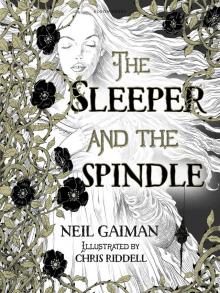 The Sleeper and the Spindle
The Sleeper and the Spindle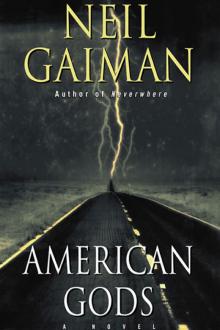 American Gods
American Gods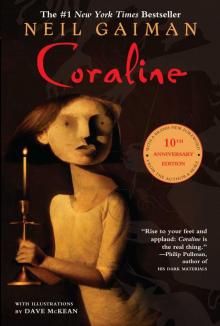 Coraline
Coraline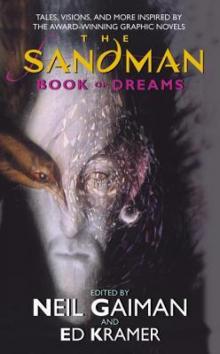 The Sandman: Book of Dreams
The Sandman: Book of Dreams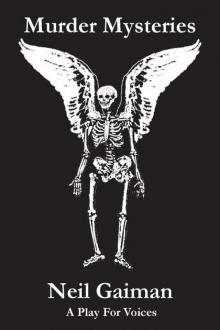 Murder Mysteries
Murder Mysteries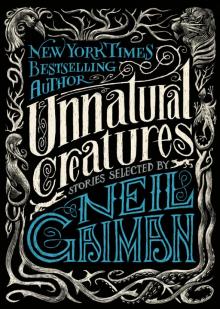 Unnatural Creatures
Unnatural Creatures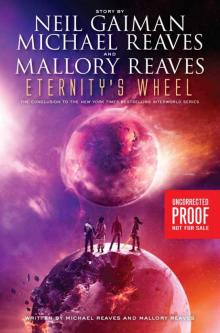 Eternity's Wheel
Eternity's Wheel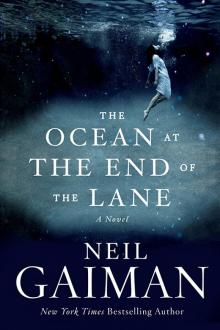 The Ocean at the End of the Lane
The Ocean at the End of the Lane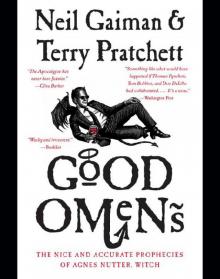 Good Omens
Good Omens Stardust
Stardust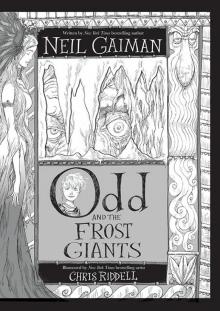 Odd and the Frost Giants
Odd and the Frost Giants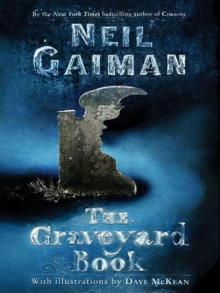 The Graveyard Book
The Graveyard Book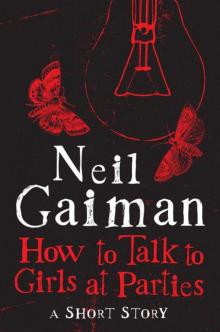 How to Talk to Girls at Parties
How to Talk to Girls at Parties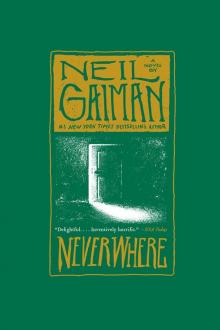 Neverwhere
Neverwhere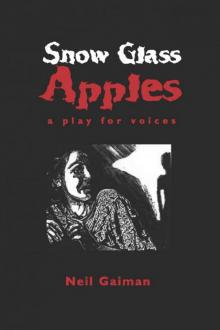 Snow, Glass, Apples
Snow, Glass, Apples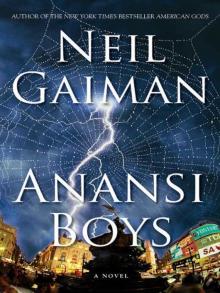 Anansi Boys
Anansi Boys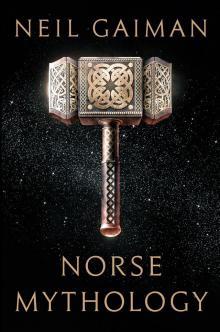 Norse Mythology
Norse Mythology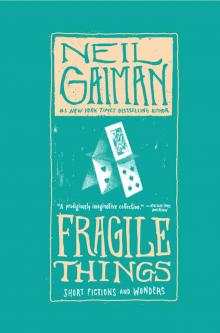 Fragile Things: Short Fictions and Wonders
Fragile Things: Short Fictions and Wonders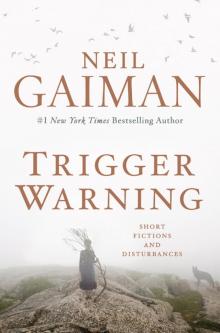 Trigger Warning: Short Fictions and Disturbances
Trigger Warning: Short Fictions and Disturbances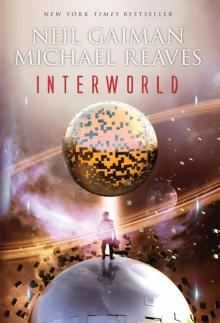 InterWorld
InterWorld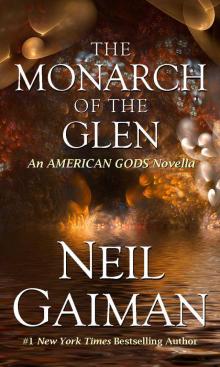 The Monarch of the Glen
The Monarch of the Glen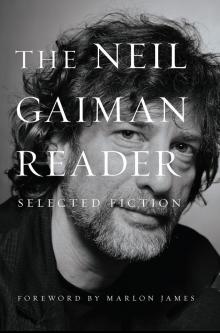 The Neil Gaiman Reader
The Neil Gaiman Reader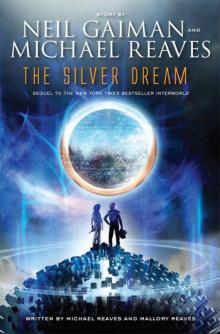 The Silver Dream
The Silver Dream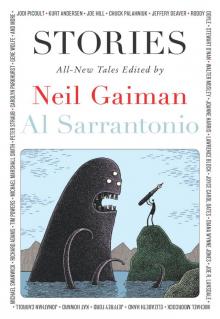 Stories
Stories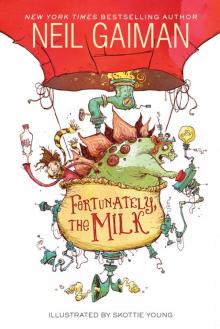 Fortunately, the Milk
Fortunately, the Milk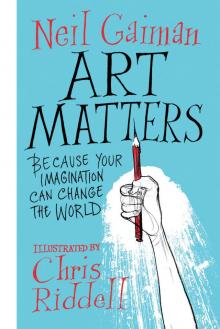 Art Matters
Art Matters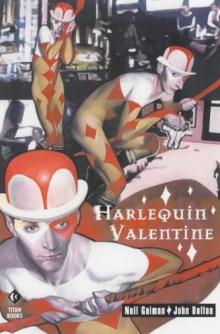 Harlequin Valentine
Harlequin Valentine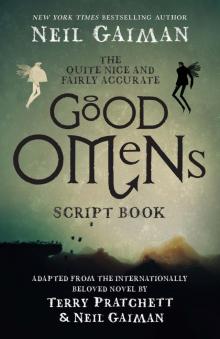 The Quite Nice and Fairly Accurate Good Omens Script Book
The Quite Nice and Fairly Accurate Good Omens Script Book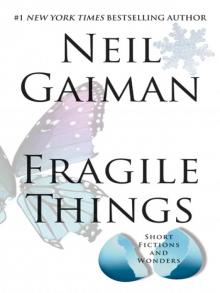 Fragile Things
Fragile Things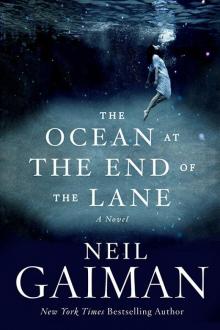 The Ocean at the End of the Lane: A Novel
The Ocean at the End of the Lane: A Novel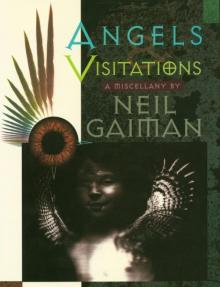 Angels and Visitations
Angels and Visitations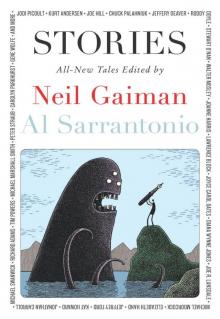 Stories: All-New Tales ngss-1
Stories: All-New Tales ngss-1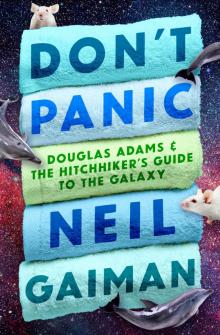 Don't Panic
Don't Panic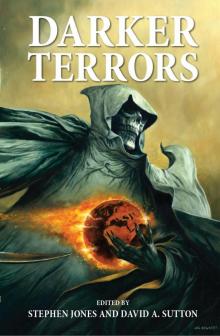 Darker Terrors
Darker Terrors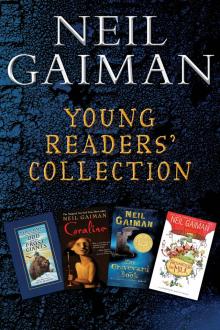 Neil Gaiman Young Readers' Collection
Neil Gaiman Young Readers' Collection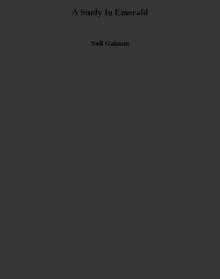 A Study In Emerald
A Study In Emerald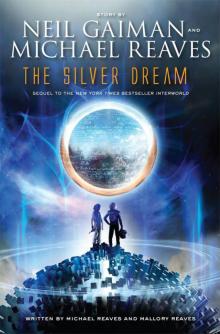 The Silver Dream: An InterWorld Novel
The Silver Dream: An InterWorld Novel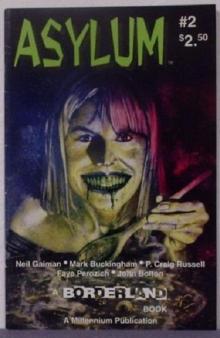 Feeders and Eaters
Feeders and Eaters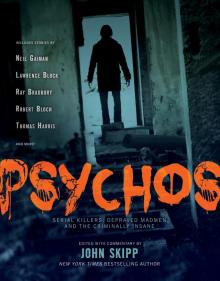 Psychos
Psychos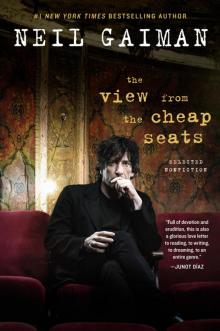 The View from the Cheap Seats
The View from the Cheap Seats Trigger Warning
Trigger Warning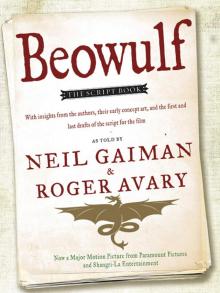 Beowulf
Beowulf Nessun Dove
Nessun Dove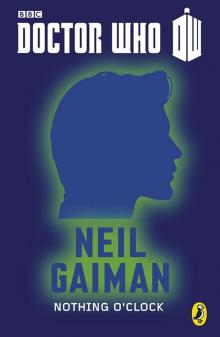 Doctor Who: Nothing O'Clock: Eleventh Doctor: 50th Anniversary
Doctor Who: Nothing O'Clock: Eleventh Doctor: 50th Anniversary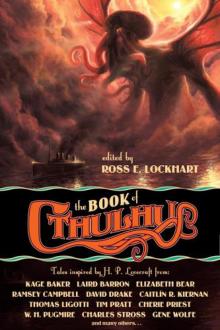 The Book of Cthulhu
The Book of Cthulhu